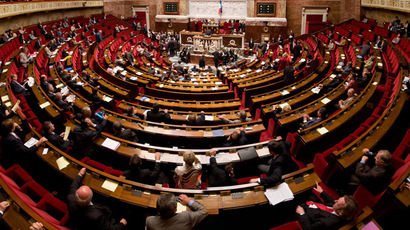Tech hub: France becomes new tax haven for R&D firms

Tech giants from all over the world choose France as a base for their businesses, as the combination of tax breaks for research and development, as well as world-class scientists has turned it into a magnet for companies.
Over 17,000 companies, ranging from biotechnology to gaming, have profited from French tax advantages and subsidies. Tax breaks worth €5.6 billion ($7 billion) this year alone, Bloomberg reports.
Some companies in France are thought to be abusing the system of tax breaks for research and development, while the country runs a budget deficit. The Finance Ministry says the average tax allowance is worth €323,500, second behind payroll credit.
French President Francois Hollande refuses to change the allowance, first introduced in the 1980s and extended by former President Nicolas Sarkozy.
“Often we have our handicaps, but here we have an advantage,” he said in an interview on national TV this month.
“The research tax breaks are decisive – they make France economically more attractive,” said Olivier Piou, the head of a Dutch digital security company Gemalto. His company along with Microsoft and China’s Huawei has based their research in France.

The country also provides international companies with other kinds of support. Foreign investors are attracted by fiscal advantages for research, granted by such state-backed organizations like the Invest in France Agency.
The French have “Cartesian thinking that software companies like us looks for,” Gemalto’s Piou said.
This year, France had 276,400 science, mathematics, and computing graduates. With the latest data from Eurostat putting it right behind Germany, the European leader in manufacturing, and the UK, the leader in financial services.
“The fiscal context isn’t our first motivation, but of course it’s an advantage France has over other countries,” said Isabelle Leung, a spokeswoman for Huawei in France. “In order of importance, we’re here for the competency of the candidates, the ecosystem, as well as the research tax breaks.”
Europe has long lured companies from all over the world, fighting rising unemployment rates. Ireland can boast the European headquarters of such companies as Google and Apple, with its corporate tax of 12.5 percent, In France it is up to 33.3 percent. Cyprus offers low income tax rates, and Malta no taxes at all.
Tax avoidance has become a huge issue. Most recently, G20 member states said they would join forces to curb the issue. The official communiqué of the G20 summit, includes the “Brisbane Action Plan,” that says, “Profits should be taxed where economic activities deriving the profits are performed and where value is created.”
Another recent report, revealed more than 300 huge enterprises including PepsiCo, IKEA, and FedEx are slashing their tax bills by using Luxembourg as a tax haven. Leaked documents revealed that billions of dollars secretly passed through the Grand Duchy.
In October, finance ministers from 51 countries signed the Multilateral Competent Authority Agreement, which is destined to put an end to tax evasion and money-laundering. Another 30 countries, including Switzerland, and the Bahamas, which are known as asset hideouts, pledged to join by 2018.














